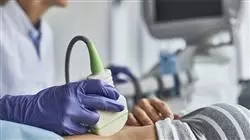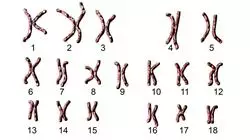University certificate
The world's largest faculty of medicine”
Introduction to the Program
Acquire in just a few weeks of intensive and stimulating work, the most advanced knowledge in reproductive genetics, with the practical ability to apply it"

Reproductive Medicine is a speciality which has been advancing at an incredible rate in the last few years, fundamentally thanks to the improvement in laboratory techniques and the development of new genetic diagnosis techniques. In many cases, they can shed light on the failure of previous reproductive treatments by offering new alternatives.
Doctors in this field should stay up-to-date on the area of diagnosis and treatment, but should also deepen their knowledge of the work that takes place in the laboratory. This helps to be able to transmit the necessary information to patients, especially if treatments aren’t successful. Likewise, within the laboratory, there must be an understanding of the work of the practice, the types of stimulation and the different factors that can affect the outcome of the treatments. Team work in the Human Reproduction Unit is what allows the treatments to be more personalized.
The objective of this Postgraduate certificate is to give a global vision to all professionals that allows them to keep up-to-date in the work of the entire Assisted Reproduction Unit.
Spread over 12 months, this Postgraduate certificate is composed of 11 modules and more than 50 topics, where important and innovative aspects will be addressed. These include the latest developments in the study of the female factor, especially at the level of endometrial factor and in-depth study of the male factor. In addition there is focus on applications of genetic techniques in improving results, improvements in the laboratory through time-lapse systems, culture media and quality control systems. All this has been designed by a team of leading specialists in Reproductive Medicine in each one of the aspects dealt with throughout the course.
With a methodological design based on proven teaching techniques, this Postgraduate certificate course will take you through different teaching approaches to allow you to learn in a dynamic and effective way”
This Postgraduate certificate in Genetics of Reproduction is the most comprehensive and up-to-date educational program on the market. The most important features of the program include:
- Latest technology in online teaching software
- Highly visual teaching system, supported by graphic and schematic contents that are easy to assimilate and understand
- Practical cases presented by practising experts
- State-of-the-art interactive video systems
- Teaching supported by telepractice
- Continuous updating and recycling systems
- Self-regulating learning: full compatibility with other occupations
- Practical exercises for self-evaluation and learning verification
- Support groups and educational synergies: questions to the expert, debate and knowledge forums
- Communication with the teacher and individual reflection work
- Content that is accessible from any fixed or portable device with an Internet connection
- Supplementary documentation databases are permanently available, even after the course
This course has been created to quickly obtain the most advanced knowledge of the medical and scientific panorama in the use of genetics in the assisted reproduction intervention environment"
Our teaching staff is composed of medical professionals, practising specialists. In this way, we ensure that we provide you with the training update we are aiming for. A multidisciplinary team of professors form and experience in different environments, who will develop the theoretical knowledge in an efficient way, but, above all, will bring their practical knowledge derived from their own experience to the course: one of the differential qualities of this Postgraduate certificate.
The efficiency of the methodological design of this master's degree, enhances the student's understanding of the subject. Developed by a multidisciplinary team of e-learning experts, it integrates the latest advances in educational technology. This way, you will be able to study with a range of comfortable and versatile multimedia tools that, will give you the operability you need in your training.
The design of this program is based on Problem-Based Learning: an approach that conceives learning as a highly practical process. To achieve this remotely, we will use telepractice: with the help of an innovative interactive video system, and learning from an expert, you will be able to acquire the knowledge as if you were actually dealing with the scenario you are learning about. A concept that will allow you to integrate and fix learning in a more realistic and permanent way.

Our innovative telepractice concept will give you the opportunity to learn through an immersive experience, which will provide you with a faster integration and a much more realistic view of the contents: “learning from an expert”
Why study at TECH?
TECH is the world’s largest online university. With an impressive catalog of more than 14,000 university programs available in 11 languages, it is positioned as a leader in employability, with a 99% job placement rate. In addition, it relies on an enormous faculty of more than 6,000 professors of the highest international renown.

Study at the world's largest online university and guarantee your professional success. The future starts at TECH”
The world’s best online university according to FORBES
The prestigious Forbes magazine, specialized in business and finance, has highlighted TECH as “the world's best online university” This is what they have recently stated in an article in their digital edition in which they echo the success story of this institution, “thanks to the academic offer it provides, the selection of its teaching staff, and an innovative learning method aimed at educating the professionals of the future”
A revolutionary study method, a cutting-edge faculty and a practical focus: the key to TECH's success.
The most complete study plans on the university scene
TECH offers the most complete study plans on the university scene, with syllabuses that cover fundamental concepts and, at the same time, the main scientific advances in their specific scientific areas. In addition, these programs are continuously being updated to guarantee students the academic vanguard and the most in-demand professional skills. In this way, the university's qualifications provide its graduates with a significant advantage to propel their careers to success.
TECH offers the most comprehensive and intensive study plans on the current university scene.
A world-class teaching staff
TECH's teaching staff is made up of more than 6,000 professors with the highest international recognition. Professors, researchers and top executives of multinational companies, including Isaiah Covington, performance coach of the Boston Celtics; Magda Romanska, principal investigator at Harvard MetaLAB; Ignacio Wistumba, chairman of the department of translational molecular pathology at MD Anderson Cancer Center; and D.W. Pine, creative director of TIME magazine, among others.
Internationally renowned experts, specialized in different branches of Health, Technology, Communication and Business, form part of the TECH faculty.
A unique learning method
TECH is the first university to use Relearning in all its programs. It is the best online learning methodology, accredited with international teaching quality certifications, provided by prestigious educational agencies. In addition, this disruptive educational model is complemented with the “Case Method”, thereby setting up a unique online teaching strategy. Innovative teaching resources are also implemented, including detailed videos, infographics and interactive summaries.
TECH combines Relearning and the Case Method in all its university programs to guarantee excellent theoretical and practical learning, studying whenever and wherever you want.
The world's largest online university
TECH is the world’s largest online university. We are the largest educational institution, with the best and widest online educational catalog, one hundred percent online and covering the vast majority of areas of knowledge. We offer a large selection of our own degrees and accredited online undergraduate and postgraduate degrees. In total, more than 14,000 university degrees, in eleven different languages, make us the largest educational largest in the world.
TECH has the world's most extensive catalog of academic and official programs, available in more than 11 languages.
Google Premier Partner
The American technology giant has awarded TECH the Google Google Premier Partner badge. This award, which is only available to 3% of the world's companies, highlights the efficient, flexible and tailored experience that this university provides to students. The recognition as a Google Premier Partner not only accredits the maximum rigor, performance and investment in TECH's digital infrastructures, but also places this university as one of the world's leading technology companies.
Google has positioned TECH in the top 3% of the world's most important technology companies by awarding it its Google Premier Partner badge.
The official online university of the NBA
TECH is the official online university of the NBA. Thanks to our agreement with the biggest league in basketball, we offer our students exclusive university programs, as well as a wide variety of educational resources focused on the business of the league and other areas of the sports industry. Each program is made up of a uniquely designed syllabus and features exceptional guest hosts: professionals with a distinguished sports background who will offer their expertise on the most relevant topics.
TECH has been selected by the NBA, the world's top basketball league, as its official online university.
The top-rated university by its students
Students have positioned TECH as the world's top-rated university on the main review websites, with a highest rating of 4.9 out of 5, obtained from more than 1,000 reviews. These results consolidate TECH as the benchmark university institution at an international level, reflecting the excellence and positive impact of its educational model.” reflecting the excellence and positive impact of its educational model.”
TECH is the world’s top-rated university by its students.
Leaders in employability
TECH has managed to become the leading university in employability. 99% of its students obtain jobs in the academic field they have studied, within one year of completing any of the university's programs. A similar number achieve immediate career enhancement. All this thanks to a study methodology that bases its effectiveness on the acquisition of practical skills, which are absolutely necessary for professional development.
99% of TECH graduates find a job within a year of completing their studies.
Postgraduate Certificate in Reproductive Genetics
If you are interested in exploring the secrets of reproductive genetics and wish to expand your knowledge in this fascinating field, TECH Global University's Postgraduate Certificate in Reproductive Genetics is perfect for you. Through our online modality, you will have the opportunity to delve into the latest principles and advances in reproductive genetics without geographical restrictions or time constraints. The Postgraduate Certificate in Reproductive Genetics will provide you with a solid theoretical and practical foundation in the fundamentals of genetics applied to reproduction. You will learn about the mechanisms of inheritance, assisted reproductive technologies and the latest research in reproductive genetics. Our up-to-date curriculum has been designed by experts in the field of genetics and reproduction. Through interactive materials, case studies and hands-on activities, you will be able to apply your knowledge and develop skills relevant to reproductive genetics. By completing the Postgraduate Certificate in Reproductive Genetics, you will be prepared to address challenges in the field of reproductive genetics and contribute to the advancement of reproductive medicine. You will be able to apply your knowledge in genetic counseling, embryo selection and preimplantation genetic diagnosis, among other key aspects of reproductive genetics.
Enroll now and start advancing in your professional path.
At TECH Global University, we understand the importance of the online modality to facilitate your access to quality education. Our program gives you the flexibility to study from anywhere and at any time that fits your schedule. In addition, you will enjoy the benefits of learning in an interactive online environment, where you can connect with professionals and students from all over the world. Broaden your academic and professional horizons with this online TECH Global University Postgraduate Certificate in Reproductive Genetics. Join our educational community and acquire the knowledge you need to excel in the field of reproductive genetics.







